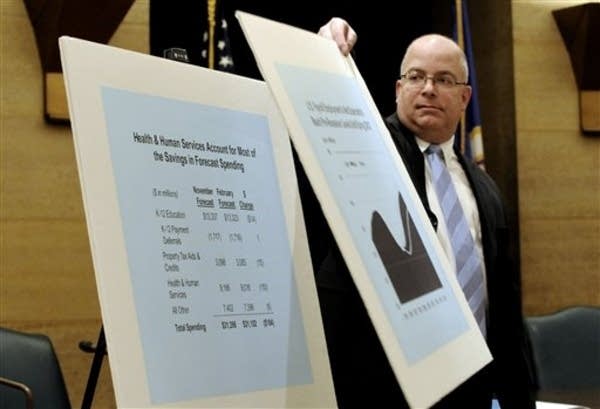Sparring continues, even with better budget news
Go Deeper.
Create an account or log in to save stories.
Like this?
Thanks for liking this story! We have added it to a list of your favorite stories.

Minnesota lawmakers found out Tuesday they have a slightly smaller budget problem to fix this session, but the red ink is expected to run deeper in the future.
State finance officials released a new economic forecast that shows the current deficit at $994 million, down from $1.2 billion just three months ago.
Minnesota Management and Budget Commissioner Tom Hanson pointed out the rarity of delivering good economic news during his three and a half years on the job.
Even though state finances remain in the red, Hanson was pleased to show a $209 million improvement from the December forecast due to reduced spending and a bump in revenues.
Turn Up Your Support
MPR News helps you turn down the noise and build shared understanding. Turn up your support for this public resource and keep trusted journalism accessible to all.
Hanson said most of the improvement is tied to an influx of federal money for Medicaid reimbursements.
"I think this [forecast] is continued evidence that our economy has bottomed out and we are on a long, slow road to recovery," said Hanson.
The projection for the next two-year budget cycle is not as good -- showing the shortfall growing to $5.8 billion in 2011-2013.
Infographic
See details of Minnesota budget forecasts, 2001-2010.
Hanson downplayed that aspect of the forecast, pointing out that the Legislature could reduce that number to below $3 billion by making Gov. r Tim Pawlenty's unallotment cuts from last year permanent.
Pawlenty later made the same argument, and he emphasized that long-term forecasts are the best guesses of economists.
"Sometimes they're right. Sometimes they're wrong. Sometimes they're horribly wrong. They don't know," said Pawlenty. "They do the best that they can. But the economy has lots of moving parts, and the forecasts vary, as we've seen over the last 10 and 20 years, by significant amounts."
Pawlenty said the new forecast is a good step in the right direction, but he warned that the state is not yet out of the woods. The Republican governor said he wants to use the $209 million to beef up the state's cash flow account to prevent the need for short-term borrowing.
Pawlenty also called on Democrats in the House and Senate to present their budget-balancing proposal by March 17, two months ahead of the deadline for adjournment. He described the DFL plan to tackle budget cuts in phases an "odd way to do business."

"I think it's another way of saying, we don't want to do the hard stuff until the very end. We don't want to let the people of Minnesota have a chance to see and hear and feel what we've proposed. We want to slip it in in the last minute in the dark of night," said Pawlenty. "It's unfortunate, but I can't control the way they do business."
Democrats don't like the governor's approach to the budget, either. They claim Pawlenty's supplemental budget plan relies on too much one-time money, including a big chunk of anticipated federal money that Congress has yet to approve.
DFL Senate Majority Leader Larry Pogemiller said the governor's proposal also falls far short in making permanent spending cuts.
"I don't think you can claim that you can balance the budget with cuts alone if you're not even willing to propose it," said Pogemiller. "That's just a mathematical calculation there. He has not yet proposed a budget that cuts $1 billion."
House Speaker Margaret Anderson Kelliher said Gov. Pawlenty's legacy is that he left the state in worse shape than he found it.

Kelliher, who's a DFL candidate for governor, said she wants to take action this session to balance the current budget and help lessen the problem for the next budget.
"We are very upfront with Minnesotans. We believe a balanced approach to a budget has always been the best solution, which is making sure that we're making reductions in budgets, but also doing some form of revenue. This governor is unwilling to listen to that message," said Kelliher.
Republican legislators said they reject the DFL premise that tax increases are needed.
Lawmakers are ready to dig deeper into the revenue forecast. Two Senate committees have a joint hearing scheduled Wednesday morning. Two House panels will do the same later in the day.



